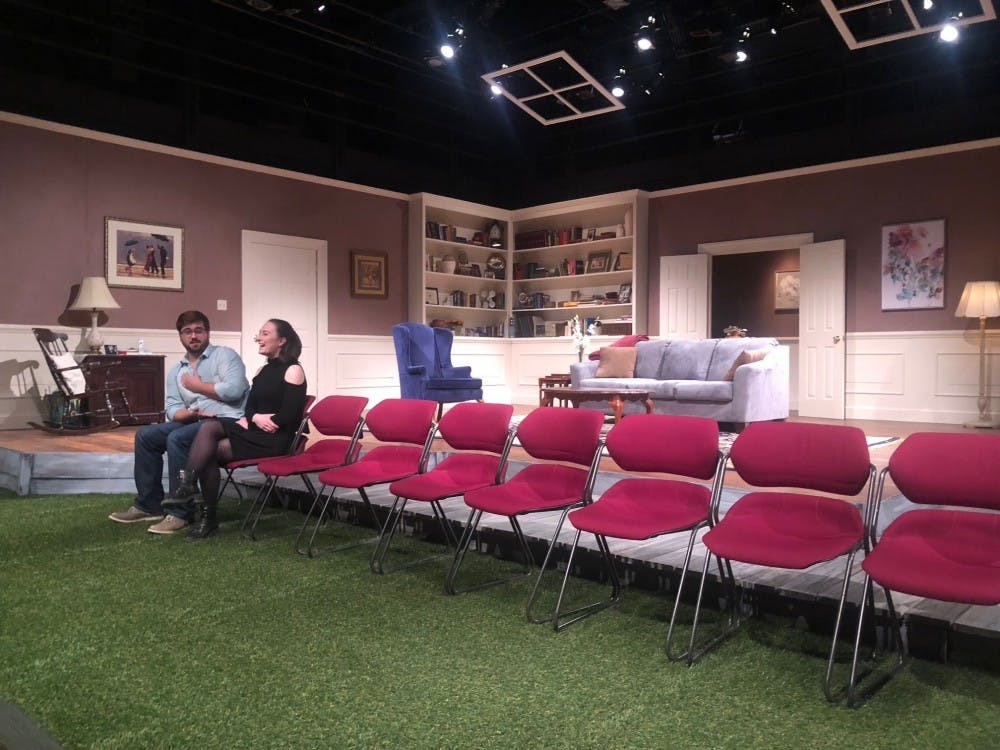Three University of Richmond seniors saw months of work come to fruition in their production of “Rapture, Blister, Burn” by Gina Gionfriddo as part of the Production Studies III capstone for theatre majors on Feb. 7.
This year’s production was led by PS III students senior Bailey Daigle (director), senior Liz Minder (lighting designer) and senior Kristop Rosario (sound designer/props manager). The creative team, student volunteers and faculty advisers were also integral to this production’s success.
Daigle, Minder and Rosario were offered a list of five plays to choose from in April 2018 and evaluated them over the summer. They eventually settled on “Rapture, Blister, Burn” in the fall.
The show highlights a humorous and intergenerational perspective on feminism, marriage and the societal norms women are confronted with. Rosario was particularly excited by this selection.
“It’s a bit like being in a classroom," Rosario said. "You get to watch, but you’re also learning about feminism. I want this to provoke conversations."
Following their selection, the students pitched themselves to faculty advisers for individual production assignments and began working to produce the show. Professor Maja White, the faculty adviser for lighting and sound, shared her perspective on the process.
“This breaks down to individual mentorship with the professor of that discipline in addition to the continued work as a class," White said. "The theater is the lab in which they make a production happen."
Casting occurred at the end of the fall semester, leaving the full cast and crew only three weeks this semester to perfect everything.
“Come the first week back it was hit the ground running," Rosario said. "All these plans were set, but they needed to be executed. Liz orchestrated the hanging of the lights, I went searching for props and began buying songs off iTunes, and Bailey was running rehearsals."
Despite the speed, the cast was impressed by the organization and professionalism the production team displayed. First-year Juliette Copeland, who played the part of “Avery,” noted that although she had acted in student-directed plays before, the preparedness of the PS III students impressed her. Julie Fulcher, who played the part of “Alice,” agreed.
“It’s a really cool experience," Fulcher, a Shenandoah graduate, said. "This is an incredible program. I wish that my university had offered this sort of opportunity.”
Senior Chandler Tempest, who played the role of “Don,” loved acting in the PS III production because of its uniqueness.
Enjoy what you're reading?
Signup for our newsletter
“It’s very interesting to see how they want you to present the character," Tempest said. "It’s a very different and new experience to be led by other students."
Aside from script changes, the students brought their interpretations of the play to life. Director Daigle focused on blocking scenes and working with the actors to optimize the black box theater.
“A lot of what makes this show cool is that there’s no grand dramatic action," Daigle said. "It is very much these mostly normal people interacting and you get to see them very intimately in a smaller space."
As lighting designer, Minder worked to represent the passage of time over the course of the show.
“I decided that lighting during transitions would be essential to making this clear," Minder said. "I was able to get a grant from the university to actually build a custom scroller which scrolls through different colors of lights."
This allowed her to track time through skylights, imitate a sunset and more. One of White’s most memorable moments from mentoring came when Minder got the scrollers working.
“I remember her saying something about knowing that all the work she had done should mean her idea is going to work, but it wasn't really real that it would until she saw it,” White said.
Another memorable moment came when Rosario found success with his sound design.
“When something worked well and he knew it, there was a little smile that would cross his face as he worked, knowing that his design was moving forward,” White said.
“Rapture, Blister, Burn” ran four times during the week, starting on Thursday, Feb. 7. The Saturday night audience appeared to enjoy the performance throughout and stayed to ask questions at the end. White was not the only person who took note of her students' decisions. The audience asked about stage directions, lighting choices, music and more.
After opening night, the PS III students got to sit back and relax.
“It was cathartic to see the whole process come to life," Rosario said. "I took in all these new things as a casual observer, especially decisions Liz and Bailey had made without me noticing before. Seeing everybody’s hard work manifest in this two-hour bundle was awesome.”
Contact features writer Grace Kiernan at grace.kiernan@richmond.edu.
Support independent student media
You can make a tax-deductible donation by clicking the button below, which takes you to our secure PayPal account. The page is set up to receive contributions in whatever amount you designate. We look forward to using the money we raise to further our mission of providing honest and accurate information to students, faculty, staff, alumni and others in the general public.
Donate Now



